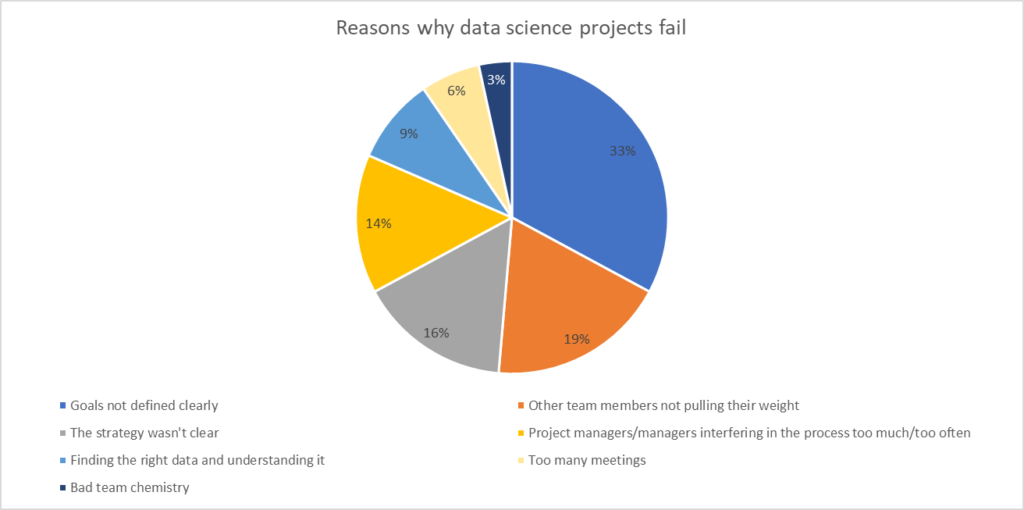Reddit is a charming corner of the Internet… Fine, we can admit that it can be charming and horrible at the same time. However, what’s great about this medium is the fact that there are so many users who engage in a conversation on a daily basis.
We asked data scientists, why, in their opinion, certain projects never get completed OR get delayed. With over 1,000 respondents, we collected the answers, and categorised them. Every single point on the list could be addressed by organisations, and lead to improved efficiency, and faster cycles.
Any guesses what was given as the main reason? See the chart below to find out the answer.
—
While many details were given specific to each project, we were able to categorise most of these reasons into wider groups. Turns out the top reason is very simple…
—

Defining goals with precision
At the forefront, a staggering 33% of data scientists felt that projects often derail due to goals not defined clearly. Ambiguous objectives can result in misdirection and inefficiencies. Having a concrete aim provides teams a clear path to follow, ensuring that everyone is aligned. Companies can counteract this by investing time in project initiation phases, ensuring clarity and alignment across teams. Regular check-ins to review goals can also ensure projects remain on track.
That doesn’t necessarily mean an agile framework, though when it’s done right it can certainly help.
Team responsibility and ownership
Secondly, other team members not pulling their weight was a concern for 19% of respondents. A lack of responsibility and ownership can gravely hinder project progression. When all members don’t contribute equally, the entire team’s momentum can be disrupted. Fostering a culture of accountability and continuous feedback can help in mitigating such issues. Recognising and rewarding proactive team members might also encourage positive contributions.
Clarity in strategy
Close behind, the strategy wasn’t clear was indicated by 16% of the participants. A muddled strategy is like navigating without a compass. Without a clear direction, teams might find themselves revisiting and redoing tasks. To combat this, businesses should emphasise regular strategy communication and feedback sessions. Workshops focusing on strategic alignment can also be beneficial.
Management interference
Unsurprisingly, 14% of data scientists cited too much intervention from project managers/managers interfering in the process. Over-involvement can stifle creativity and slow down the workflow. Managers should be facilitators, not obstacles. A trust-based management style, focusing on outcomes rather than constant oversight, might be the solution. Periodic training for managers can help them strike the right balance.
Challenges with data
Data-related issues cropped up repeatedly. Finding the right data and understanding it troubled 9% of the polled scientists. As one respondent noted, locating the precise data, understanding its intricacies, and sourcing experts familiar with it can be a convoluted journey. It’s a multi-layered challenge, reflecting the complexity of modern data ecosystems. Organisations could benefit from a centralised data repository and regular training sessions to understand this data. It’s also important to foster an environment where data is respected and its importance acknowledged.
Meeting overload
With 6% flagging too many meetings as a deterrent, it’s clear that excessive discussions can be counterproductive. The sentiment, “Let’s have a pre-meeting to plan for the meeting,” resonated with many. It’s not just the number, but the efficacy of these meetings that’s under scrutiny. Streamlining meetings and setting clear agendas can alleviate this pain point. Employing efficient project management tools might also help in reducing redundant meetings.
Team dynamics matter
Lastly, bad team chemistry accounted for 3% of the responses. Cohesive teams drive successful projects. When team members don’t get along, even simple tasks can become challenging. Investing in team-building activities and conflict resolution training can work wonders here. Encouraging open communication can also ensure that minor disagreements don’t escalate.
—
Additional insights from the community
- Many lamented over clients or end users being indecisive, echoing the sentiments on clear goal definitions. Clear communication and feedback loops with stakeholders can help align expectations.
- A section of the community felt stifled by forced technology choices, which can indeed be detrimental if they don’t align with project needs. Ensuring that tech decisions are driven by project needs, not just brand allegiances, can be a game-changer.
- The mythical person-month issue and the over-reliance on key individuals emphasise the importance of spreading knowledge and not being overly reliant on single team members. Cross-training and knowledge sharing sessions can address this gap.
- Some cited being asked to do the impossible, reflecting the need for realistic expectations. This reiterates the need for clear communication between teams and stakeholders.
- The academic mindset, where professionals just want to experiment without producing tangible outcomes, can delay projects. While innovation is key, it’s essential to ensure that it aligns with business objectives. Recognising and addressing this is crucial for timely project completion.
- Concerns over contract escalating contractors suggest the importance of transparent and honest partnerships. For example, if the company is hiring a third party to provide certain data/service, which the data team rely on, they need to ensure that contractual terms are clear, fair, and focused on delivering value. If the contractors can “blackmail” the company by withholding certain information unless the company “upgrades to premium service”, that can result in projects being delayed or even being cancelled.
—
In conclusion, the world of data science is intricate. Understanding these intricacies and addressing the highlighted challenges are pivotal steps towards successful project outcomes. Armed with this knowledge, companies can pave the way for a more streamlined and efficient data science journey.

